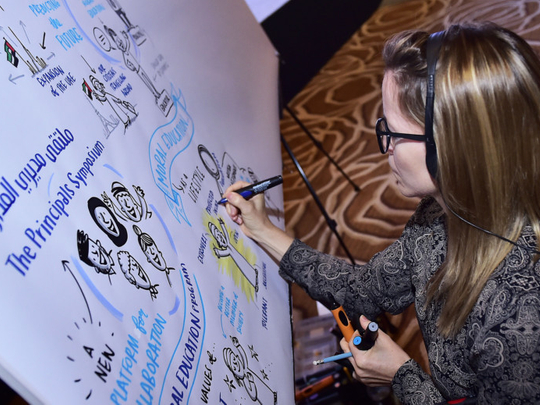
Dubai: Schools that piloted the new moral education curriculum that must be integrated in all UAE schools shared their experience for the first time during the Principals Symposium in Dubai on Monday, describing it as easy to implement and fruitful.
Public and private schools will start integrating moral education into their regular curriculum in the coming academic year (2017-18), following 19 schools that implemented a pilot programme earlier this year.
Moral Education is a national initiative announced in 2016 by His Highness Shaikh Mohammad Bin Zayed Al Nahyan, Crown Prince of Abu Dhabi and Deputy Supreme Commander of the UAE Armed Forces. It aims to instil commendable behaviour and qualities in students, while also creating awareness on UAE heritage and culture.
The programme breaks new ground in that it is not confined to textbooks, classrooms or exams. Schools are free to implement whatever steps they want to achieve the goals of the new subject, which will be assessed by authorities as part of overall student development evaluations, which are already included in official school inspections.
Hussain Bin Ebrahim Al Hammadi, Minister of Education, said in his opening remarks at the event that moral education will reintroduce the culture of learning in traditional UAE society, where parents, neighbours and elders were also regarded as “educators”. He added that the new system was “easy and versatile” to implement.
Jameela Al Muhairi, Minister of State for Public Education, said once the subject rolls out next school year, and a consensus is formed on standards, training will provided to schools as required. She added that the ethos behind the rollout was “not about assessment. It is to ensure best practices are implemented in schools”.
Dr Ali Al Nuaimi, director-general of Abu Dhabi Education Council, said moral education is not resource-heavy, urging schools to be creative in coming up with ways to teach the ethos. “You [school leaders] are the decision makers in this. Stop throwing responsibility [of student welfare] on others. Your success is the success of our students, schools, community and the nation. We are with you,” he added.
Dr Abdullah Al Karam, director-general of Knowledge and Human Development Authority, said moral education will spark a new era in education in the UAE. “This topic is different; it is more concerned with the development of the human being. It’s not for the brain to acquire, like physics or maths; it’s for the heart, to be instilled inside,” he added.
Mohammad Al Hammadi, principal of Ali Bin Abi Taleb School, one of the pilot moral education schools, said his students were not asked to learn definitions of morality, tolerance and other traits. They were instead asked to participate in tasks where they would be expected to put such qualities into practice. Those tasks were a mixed bag of real situations, such as caring for the elderly, and simulations, such as interviews on how they would treat particular kinds of guests.
“We didn’t give percentage marks on truthfulness [for example]. We observed how students behaved and we led by example,” Al Hammadi said.
Brendan Law, headmaster at the UK-curriculum Cranleigh School in Abu Dhabi, another pilot school, said: “We want to make sure it’s not just about academic learning, that there’s a holistic programme in place. Moral education gives us that direction to take it forward.”
Law added that his school already has pastoral learning systems in place that absorbed the new curriculum “seamlessly”. He gave examples of learning at the school that focused on Emirati values and culture.












